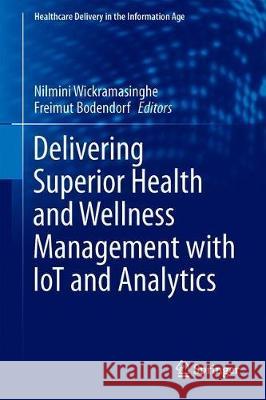Delivering Superior Health and Wellness Management with Iot and Analytics » książka



Delivering Superior Health and Wellness Management with Iot and Analytics
ISBN-13: 9783030173463 / Angielski / Twarda / 2019 / 677 str.
Delivering Superior Health and Wellness Management with Iot and Analytics
ISBN-13: 9783030173463 / Angielski / Twarda / 2019 / 677 str.
(netto: 575,06 VAT: 5%)
Najniższa cena z 30 dni: 578,30
ok. 16-18 dni roboczych.
Darmowa dostawa!
Prof Nilmini Wickramasinghe is the inaugural Professor–Director Health Informatics Management at Epworth HealthCare and the Professor of Digital Health and Deputy Director of the Iverson Health Innovation Research Institute at Swinburne University as well as an honorary Professor at the Peter MacCallum Cancer Centre. After studying at the University of Melbourne, she accepted a full scholarship to undertake PhD studies in the US in Management of Information Systems as they relate to healthcare contexts. For over 20 years she has been actively, researching and teaching within the health informatics domain. Her particular focus is on designing and developing suitable models, strategies and techniques grounded in various management principles to ensure that technology solutions effect superior, value-based, patient centric care delivery. Professor Wickramasinghe collaborates with leading scholars at various premier healthcare organizations throughout Australasia, US and Europe and is well published with more than 380 referred, peer reviewed scholarly articles, more than 12 books, numerous book chapters, an encyclopaedia, a patent and a well-established funded research track record. Professor Wickramasinghe is the editor-in-chief of two scholarly journals published by InderScience and has successfully taken four separate health technology solutions from idea to realisation in the US.
This in-depth book addresses a key void in the literature surrounding the Internet of Things (IoT) and health. By systematically evaluating the benefits of mobile, wireless, and sensor-based IoT technologies when used in health and wellness contexts, the book sheds light on the next frontier for healthcare delivery. These technologies generate data with significant potential to enable superior care delivery, self-empowerment, and wellness management. Collecting valuable insights and recommendations in one accessible volume, chapter authors identify key areas in health and wellness where IoT can be used, highlighting the benefits, barriers, and facilitators of these technologies as well as suggesting areas for improvement in current policy and regulations.
Four overarching themes provide a suitable setting to examine the critical insights presented in the 31 chapters:
- Mobile- and sensor-based solutions
- Opportunities to incorporate critical aspects of analytics to provide superior insights and thus support better decision-making
- Critical issues around aspects of IoT in healthcare contexts
- Applications of portals in healthcare contexts
A comprehensive overview that introduces the critical issues regarding the role of IoT technologies for health, Delivering Superior Health and Wellness Management with IoT and Analytics paves the way for scholars, practitioners, students, and other stakeholders to understand how to substantially improve health and wellness management on a global scale.
1997-2026 DolnySlask.com Agencja Internetowa
KrainaKsiazek.PL - Księgarnia Internetowa









